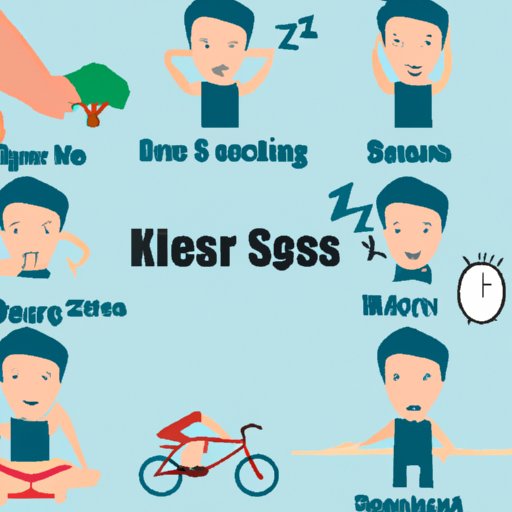Introduction
Stress is an inevitable part of life, but it doesn’t have to be overwhelming. When left unchecked, stress can take a toll on our mental and physical health, leading to headaches, fatigue, depression, and other physical ailments. Fortunately, there are many effective strategies for managing stress. Here, we’ll discuss five of the most effective stress management techniques that can help reduce anxiety and improve wellbeing.
Create a Relaxation Routine
Creating a relaxation routine is one of the most important stress management techniques. Relaxation activities such as deep breathing, yoga, or meditation can help reduce tension and promote feelings of calmness. According to a study conducted by Harvard Medical School, “Relaxation techniques can help you cope with everyday stress and with stress related to various health problems.”
Benefits of developing a relaxation routine include improved concentration, better sleep, and reduced levels of stress hormones such as cortisol. To create a relaxing routine, start by setting aside a few minutes each day for relaxation. This can be done at any time of the day, though some people find it easier to relax in the morning or evening. During your relaxation time, focus on your breathing, practice yoga poses, or meditate. You can also listen to calming music or read a book.
Exercise Regularly
Regular exercise is another powerful tool for reducing stress. Exercise releases endorphins, which are hormones that make us feel good and reduce stress. It also helps to clear our minds and give us a break from stressful thoughts. According to a study published in the journal Frontiers in Psychology, “Regular physical activity can reduce symptoms of stress, anxiety, and depression.”
Benefits of regular exercise include improved energy levels, increased self-confidence, and enhanced cognitive functioning. To get the most out of your exercise routine, try different types of physical activities such as walking, running, swimming, biking, or yoga. Aim for 30 minutes of physical activity per day, and make sure to take breaks if needed.
Practice Mindfulness
Mindfulness is the practice of paying attention to the present moment without judgment. It involves focusing on your breath, being aware of your thoughts and emotions, and letting go of negative thoughts. According to a study published in the journal Mindfulness, “Mindfulness-based interventions have been found to be effective in reducing stress and improving psychological wellbeing.”
Benefits of practicing mindfulness include improved mood, increased resilience, and better coping skills. To practice mindfulness, take a few moments each day to sit quietly and focus on your breath. As thoughts arise, observe them without judgment and let them pass. You can also practice mindful movement such as yoga or tai chi, or participate in guided meditation.
Eat Healthily
Eating a healthy diet is essential for managing stress. Eating nutritious foods helps to fuel our bodies and minds, while unhealthy foods can leave us feeling sluggish and overwhelmed. According to a study published in the journal Nutrients, “A healthy diet can improve psychological wellbeing and reduce the risk of mental health problems.”
Benefits of eating a healthy diet include increased energy levels, better concentration, and improved mood. To build a balanced diet, focus on eating whole, unprocessed foods such as fruits, vegetables, whole grains, lean proteins, and healthy fats. Avoid sugary snacks and processed foods, and limit your intake of caffeine and alcohol.
Get Enough Sleep
Getting enough sleep is essential for managing stress. Sleep helps to restore our bodies and minds, and gives us the energy we need to tackle the day. According to a study published in the journal Sleep Medicine Reviews, “Adequate sleep is associated with improved emotional regulation and lower levels of stress.”
Benefits of getting enough sleep include improved concentration, better mood, and increased energy levels. To improve your sleep habits, try to maintain a consistent sleep schedule and limit daytime napping. Avoid screens before bed and create a comfortable sleeping environment. If you’re having trouble sleeping, talk to your doctor about potential solutions.
Conclusion
Stress can have a negative impact on our mental and physical health. Fortunately, there are many effective stress management techniques that can help reduce anxiety and improve overall wellbeing. These include creating a relaxation routine, exercising regularly, practicing mindfulness, eating healthily, and getting enough sleep. If you’re struggling with stress, consider trying one or more of these techniques. If needed, seek professional help from a therapist or counselor.
(Note: Is this article not meeting your expectations? Do you have knowledge or insights to share? Unlock new opportunities and expand your reach by joining our authors team. Click Registration to join us and share your expertise with our readers.)
